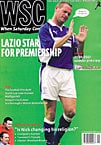 Britain's Asians are vastly under-represented in professional football. Peter Briley and Laura Manning report on an emerging footballing community
Britain's Asians are vastly under-represented in professional football. Peter Briley and Laura Manning report on an emerging footballing community
There is not one professional first team footballer from Britain’s 2.3 million Asian community. It is widely agreed that the main factors contributing to this absence have included the lack of Asian parental acceptance of football as a legitimate profession, the fear of racism within the game and, most importantly, scouts short-sightedly disregarding Asian areas and leagues.
It was hoped that the Indian national team’s recent visit could have positive effects on and off the pitch. The tour’s first match at Fulham attracted 3,000 Indian supporters, comprising nearly 50 per cent of the crowd. The all-ages crowd waved flags, shouted in Gujarati at the ref and chanted as per usual with only slight variations on well-known themes such as “We all follow the India, over land and sea… and Southall!” and “We’re the barmy Indian army, poppadom vindaloo!” Their next match against West Bromwich Albion proved even more impressive, with a turnout of over 11,000.
Some club and community schemes have tried to remedy the problem of Asian under-representation in football. Brentford, for example, have plans to open a centre on the edge of Southall. Two initial successes from such schemes were Harpal Singh, who has signed a four-year contract with Leeds United, and Amrit Sidhu, who was signed by Derby County last year but then released at the end of last season.
Charlton Athletic, too, have been working hard to gain the support of the local Asian community, with half-priced tickets, information in a variety of languages and Indian food on offer at half-time; actively creating a welcoming atmosphere. Yashim Patel of Charlton Athletic’s Race Equality Partnership explains: “If they feel there is a link with the community, the young players will want to watch and play for us and we will give them a chance.”
Although an eager Asian fan base is now undeniably present, one thing vital to inspire younger players into the Premier League is a proper role model. Bhaichung Bhutia, Indian captain and Bury forward, may be the one. When questioned after the Fulham game about this, Bhutia said: “For me at this moment, the most important thing is to do well for myself at Bury. If I do well, then everyone can share that experience and the rest will come naturally.”
Although Bhutia commands something like the level of respect and media attention in India that is associated with David Beckham over here, some have their reservations about the weight of his contribution in the English game. “[Bhutia] is a good role model for any aspiring footballer,” says Septarshi Ray, sports editor at India Weekly, “but until a genuine British Asian player makes the breakthrough, most Asians in this country will look to emulate players from the mainstream, such as Beckham, Giggs, Ince and Owen. It is rare for anyone to cite players in anything less than the First Division as a genuine hero unless they support that club.”
In addition, some believe that Bhutia’s ethnicity could prove an obstacle for British Asian fans, as they may not see the star player as representating their own experience. Dr Jim Mills, organiser of the Football India conference at University College Northampton, suggests otherwise. “You only needed to see the response that Bhutia got at Fulham, when he was kept talking to supporters for 20 minutes after the game, to see that he is very popular in the UK.”
It is acknowledged that supportive parents, an interested fan base and a talented player pool (even if not yet one that has made a major breakthrough) do exist in modern British Asian society. The only issue remaining is for clubs to commit to getting talented Asian players signed.
Piara Powar, National Campaign co-ordinator for Kick It Out! summarises the issues at hand. “Asian talent is still being ignored. It’s not enough that one or two schemes are successful. More and more clubs are realising the problem, but are not recognising how to deal with it. There are enough organisations out there offering advice; there is no excuse.”
From WSC 163 September 2000. What was happening this month